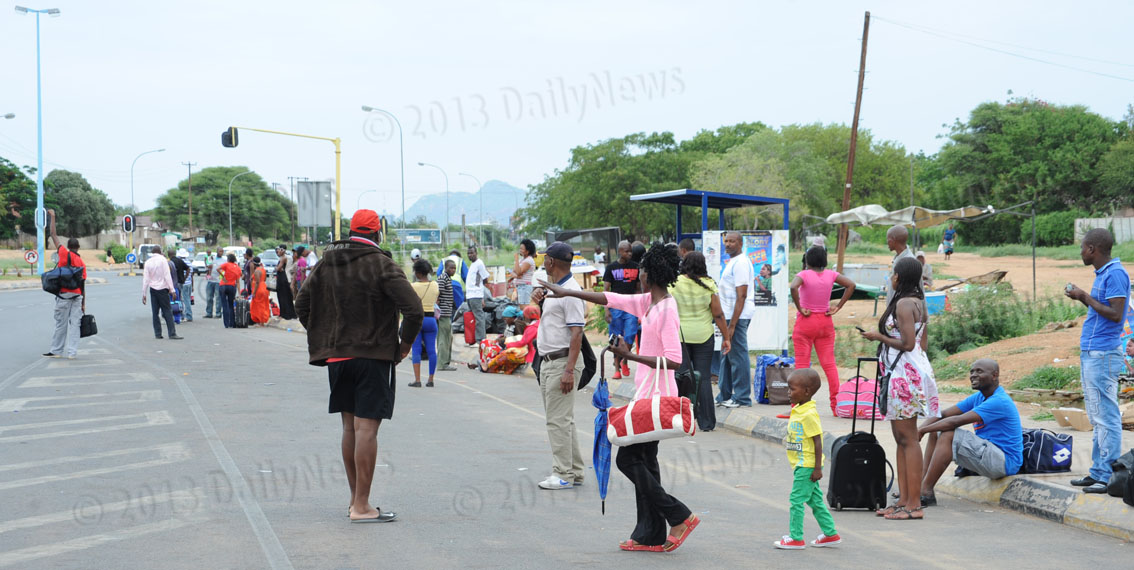Pros and cons of hitch-hiking
05 Jan 2014
Thirty-eight year-old, Ms Susan Senyatsi (not her real name) has never hitch-hiked in her life whenever traveling from Gaborone to her home village in the Central District. It came one fateful night that she decided to hitchhike, having worked late and too exhausted to walk to the bus rank.
She went to Gaborone's most prominent hiking spot of Taung to catch a ride home for the festive season. Ms Senyatsi did not have large luggage apart from the “Nkalala” handbag which she had put some few clothes. Some few people arrived at the spot but most of them were going to nearby villages of Mochudi, Morwa and Dibete.
When it struck 1930hrs, a sedan vehicle pulled out of the road and the driver announced that he would only pick those going to Francistown.
Ms Senyatsi was delighted as she was the only one going somewhere nearer to the destination of the driver. She immediately got inside the vehicle after they agreed on a destination. They exchanged names and everything seemed smooth.
Immediately after passing Morwa, the man started to drive faster and this struck Ms Senyatsi a little bit, but she brushed it off. Just some few minutes, the driver pulled off into a gravel road and drove through the bush to a nearby quarry where he raped Ms Senyatsi and robbed her of all the money that she had in the handbag before leaving her at the scene.
This is one of the many stories that had happened to people who hitchhike. Hitchhiking is one of the cheapest ways of traveling yet the most dangerous.
The Botswana Police Service, Department of Transport, Road and Safety (DTRS), Motor Vehicle Accident Fund (MVA Fund) and the Botswana Bus Operators Association (BOBOA) have appealed to all those who travel to avoid hitch hiking.
The director of traffic in the Botswana Police Service, Senior Assistant Commissioner Katlholo Mosimanegape says hitchhiking in itself is rarely illegal.
Senior Assistant Commissioner Mosimanegape however said there were many issues surrounding criminalities in hitch hiking. He said some drivers would masquerade as good samaritans when they were in real sense criminals.
He said these were drivers who would overtake carelessly and cause unnecessary accidents just because they want to make money by the wink of an eye. He added that hitchhiking also encourages pirating, which is also a serious violation of traffic regulations.
Senior Assistant Commissioner Mosimanegape said some of the drivers would in most cases, give an impression that they are travelling somewhere when in fact they are on the lookout on what to steal from the hitch-hikers, adding that women stand the risk of being raped and killed.
The police chief said there is a thin line between people who pirate and those who offer rides to travellers because the two do not care about the safety of their passengers. In this regard, he advised that when it is late, people should stay overnight and get the right transport the following day when it is daylight.
Talking to BOPA one hitch-hiker at Taung spot, Ms Muledy Kealotswe said though she is aware of the risks of hitch-hiking, she would prefer to take the risk, citing congestion in public transport and that buses are slow.
She said long distance buses such as those from Gaborone to Francistown consume a lot of time off loading and loading other passengers along the way. Another hitchhiker, Mr Isaac Mooketsi said with private transport, one reduces the five hours taken by bus from Gaborone to Francistown to three and half hours.
He said he once travelled between Gaborone and Selebi Phikwe standing because the bus was full to capacity. Mr Mooketsi sees no difference between safety associated with public service vehicles, saying recently about three buses were involved in fatal accidents.
He sees no difference whether one was travelling by public transport or private as they are both covered by the Motor Vehicle Accident Fund depending on the circumstances of the accident.
MR Mooketsi however said rail transport is far much better though slow and appealed to government to expedite its re-introduction. The question therefore is whether to hitchhike or not to. But however the police are of the view that accidents associated with public transport are minimal. ENDS
Source : BOPA
Author : Thamani Shabani
Location : GABORONE
Event : Feature
Date : 05 Jan 2014







